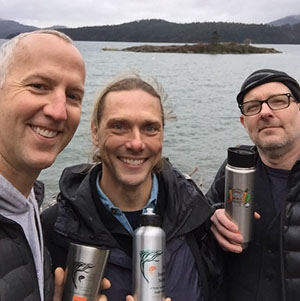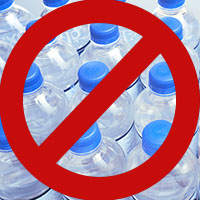— from The SeaDoc Society and The Exchange —
 Orcas Recycling Services/The Exchange and The SeaDoc Society, both Orcas based non-profits, are teaming up to put a spotlight on the negative environmental impacts of single-use beverage containers by launching a contest—the 2017 Refuse-To-Use Water Bottle & Coffee Cup Challenge.
Orcas Recycling Services/The Exchange and The SeaDoc Society, both Orcas based non-profits, are teaming up to put a spotlight on the negative environmental impacts of single-use beverage containers by launching a contest—the 2017 Refuse-To-Use Water Bottle & Coffee Cup Challenge.
Now that you’ve broken your new year’s resolutions, we have another for you. Orcas residents willing to do their best to forgo single-use containers in favor of reusable water bottles and coffee cups for all of 2017 stand to win prizes from both organizations.
“It started out when I saw SeaDoc’s January newsletter,” says ORS/Exchange Executive Director Pete Moe.“ Joe (Gaydos, SeaDoc’s Science Director) posted a picture of his favorite reusable beverage containers and challenged himself to go all year without using any single-use containers—and not to lose his reusable containers in the process. “We immediately wanted in on the action.”
That same day, Joe and Pete roughed out the details of an island-wide challenge in the bleachers during a Vikings high school basketball game.
The challenge has two parts: 1. You commit not to use single-use beverage containers all year, and 2. You commit not to lose your favorite reusable containers all year. Challenge your friends, post it on Facebook, and you can win prizes from both organizations.
Nationally, recycling rates for plastic water bottles are between 23% and 38%, depending on who you ask (anti-plastic activists or the plastic industry, respectively).
While they may argue the percentage that are recycled, neither side argues that in this country we use an astonishing 50 billion plastic bottles annually, or 1.3 billion pounds of plastic. Even at a 38% recycling rate, that’s 8.6 million pounds of plastic going into landfills—or worse.
“The Refuse-To-Use Challenge is all in fun, but there is a serious point behind it,” says Dr. Gaydos, Science Director at SeaDoc. “Most people don’t see it, but there is a lot of plastic in the ocean – from large bottles to microplastics in zooplankton. Reducing usage of single-use plastic bottles and coffee lids on Orcas Island isn’t going to fix this, but it’s one heck of a good start in the right direction.”
“From the perspective of the Exchange, we have a zero-waste mission, and part of that is education. We want people really to think twice before they go to Costco and load up the flats of bottled water,” says Moe. “That’s kind of nuts, actually. We have fantastic drinking water here on Orcas.”
Single-use coffee cups, while usually made of paper, are not much better: “Once a paper coffee cup is used, it is no longer recyclable,” explains Moe. “The coffee residue itself contaminates the paper to a point beyond recyclability,” he explains. In a landfill, paper cups decompose and create methane, one of the worst greenhouse gasses.
“People are an integral part of the Salish Sea ecosystem. Widespread public education is needed to help citizens understand how a healthy ecosystem free of plastics supports their own physical, mental, and economic well-being.” says Markus Naugle, Regional Director at SeaDoc.
To participate, be sure to get the details from either www.SeaDocSociety.org or www.exchangeorcas.org. The deadline to sign up, and post your picture to Facebook, is March 1st, 2017.
Orcas Recycling Services/The Exchange is a community-driven 501(c)(3) non-profit with a mission to: “Build a zero-waste community through service, education, and stewardship of our waste/resource stream.” Orcas Recycling Services/The Exchange has been in operation since 1984, and managing the Orcas Island Transfer Station since September 2013. www.exchangeorcas.org
Started in 2000 by the Karen C. Drayer Wildlife Health Center at UC Davis, The SeaDoc Society is a non-profit organization working to improve the health of the Salish Sea ecosystem and its fish and wildlife populations. SeaDoc has prioritized and funded over 100 scientific projects documented in more than 70 peer-reviewed publications on topics ranging from evaluating water quality and contaminants to abalone and killer whale recovery. www.SeaDocSociety.org
**If you are reading theOrcasonian for free, thank your fellow islanders. If you would like to support theOrcasonian CLICK HERE to set your modestly-priced, voluntary subscription. Otherwise, no worries; we’re happy to share with you.**









“Refuse to Use ” speaking of Trashy Challenges, and I am not talking about our new boss in DC, bur rather….something more important, reduce, reuse, recycle…..CONSUME LESS..It makes no sense to work so hard for local initiatives like Save our Salish Sea, if we as intelligent individuals are too lazy or thoughtless to stop purchasing paper cups of coffee, water bottles. Consider adding this to your own personal challenge…bring your own reusable container to the deli counter for take away food. It is easy to do, like remembering to bring your own shopping bag to market. Our climate challenge is a complex messy issue, needing multi-pronged approaches, so, PLEASE dont underestimate the importance of REDUCE and REUSE in my own/your own life. From fuel to food containers. From home to vacation. From school to work. From our beautiful (and stressed) Salish Sea to our unique (and heavily used) Moran State Park. Do it for your neighbor kids and for you grandchildren. OK, Joe, ORS and SeaDoc, I accept your challenge!
Cathy Ellis, you are a poster girl(I know woman is the correct term)/role model for this campaign, and will be the winner of this challenge.
I, on the other hand, struggle with finding my reusable water bottle as I zoom to zen many times each day. Keeping track of/using my personal drinking devise was my resolution for 2017 (SO much easier than taking the time to walk 5 miles a day). 22 days and counting…sorta like AA. The bright red one my Mom gave me helps. It has both a visual and an emotional attachment.
“Refuse to Use ” our 2017 Orcas Island Trashy Challenge, Great! ok, Joe, ORS and SeaDoc, I accept your simple challenge….reduce, reuse, recycle…..I am passing this on now to you others, plus will add, CONSUME LESS! Remember the mantra of reduce, reuse, and lastly….recycle. Reduce and reuse have taken a back seat to the over-used idea of recycle. It makes no sense to work so hard for local initiatives like “Save our Salish Sea”, if we as intelligent individuals are too lazy or thoughtless to stop purchasing coffee in single-use paper cups and drinks in single plastic servings. I will add one more piece to this challenge, AND, bring your own reusable containers to that deli counter for your take away food. It is easy to do, like remembering to bring your own shopping bag to market. Our climate challenge is a complex messy issue, needing multi-pronged approaches, so, PLEASE dont underestimate the importance of REDUCE and REUSE in our own own daily lives. From fuel to food containers. From home to holiday. School, play, work. From our beautiful (and stressed) Salish Sea, to our unique (and heavily used) Moran State Park. Do it for your neighbor kids and you grandchildren…..
Thank-you Joe Gaydos and Pete Moe!
I have been practicing this for some years – practicing, but not yet perfect.
If you bring your own real coffee or tea mug, then the server cannot pop one of those awful plastic lids on top before you can say “stop”.
I also find that keeping a clean stainless steel box in my re-usable grocery bag works well for deli purchases.
I have to admit that I had been backsliding the past month or so and have taken the easy way out by using onetime use coffee cups and water bottles. No longer. Last week (before reading this OI article on ‘Refuse to Use’!!!) I again started using my reusable Wildlife Cycles water bottle (green) and my fantastic 18 oz Hydro Flask coffee holder. We’re all allowed to backslide (once) aren’t we?